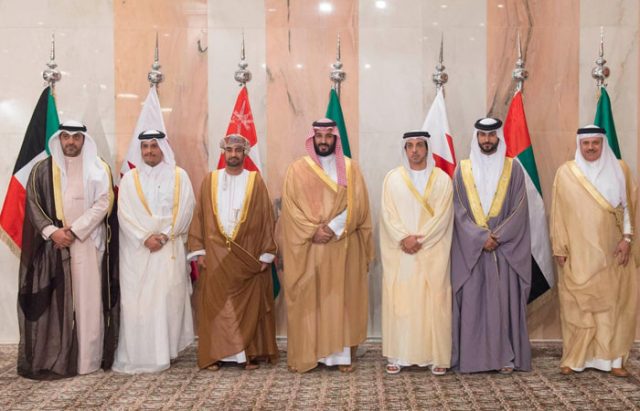
Deputy Crown Prince sees prospect of GCC becoming 6th largest economy
Deputy Crown Prince Muhammad Bin Salman, second deputy premier and minister of defense, stressed that there is an opportunity in front of the Gulf Cooperation Council (GCC) states to become the sixth largest economy in the world if they worked properly as one bloc in the coming years.
The Deputy Crown Prince, who is also chairman of the Saudi Council of Economic and Development Affairs (CEDA), made the remarks while opening the first meeting of the GCC Economic and Development Affairs Authority at the Palace of Conferences in Riyadh on Thursday.
The meeting, which concluded Thursday night, identified five basic priority areas, including boosting joint economic work, adoption of a mechanism for quick implementation of key economic decisions, comprehensive review of the GCC economic and development policies, programs and initiatives, facilitating structural, legal, financial and manpower related aspects to develop economic dimension of Gulf joint work, and giving top priority to youth affairs and issues.
The meeting was attended by Sheikh Mansour Bin Zayed Al Nahyan, deputy prime minister and minister of presidential affairs of United Arab Emirates; Sheikh Nasser Bin Hamad Al Khalifa, representative of Bahrain’s King for Charity and Youth Affairs; Khalid Bin Hilal Al-Busaidi, minister of Royal Court of Oman; Sheikh Mohammed Bin Abdulrahman Al Thani, foreign minister of Qatar; Sheikh Mohammed Bin Abdullah Al-Mubarak Al-Sabah, minister of state for Cabinet affairs of Kuwait; and GCC Secretary General Dr. Abdullatif Al-Zayani.
Earlier, in his speech Deputy Crown Prince Muhammad Bin Salman highlighted the remarkable achievements made by the Gulf bloc in the past in a way benefitting the member states and people tremendously. “There are immense opportunities that we can realize so as to embrace prosperity, growth and security in the economic field,” he said.
“Today we are trying to take advantage of these opportunities, especially as we are in an era marred by a lot of economic fluctuations in the world. This necessitates us to work together in the era of blocs,” the Deputy Crown Prince said while hoping that the Authority would be instrumental in realizing the desired objectives of GCC leaders and peoples in achieving more progress and prosperity.
The Authority has been created as an apex body of GCC in economic and development matters following a decision of the GCC Supreme Council summit held in May this year. It also takes its strength and inspiration from the sweeping economic reforms being implemented in the Kingdom under the leadership of Deputy Crown Prince Muhammad Bin Salman, who is regarded as the youthful architect and chief promoter of the Kingdom’s Vision 2030. The vision, a blue print for the Kingdom’s shining future, unveiled by Prince Muhammad on April 25, will not only overhaul the Kingdom’s economy but has the potential to ensure its prosperity in all sectors for decades to come.
On June 6, Saudi Arabia launched the National Transformation Program (NTP), setting targets for the program through 2020.
Since his appointment as CEDA chief on Jan. 29, 2015, Prince Muhammad has made addressing the long-term challenges facing the Kingdom a priority. The Vision 2030 and NTP are part of that effort. The last meeting of CEDA, chaired by Deputy Crown Prince on Monday, unveiled a package to clear all the government dues owed to private sector firms before the end of 2016.
The package consists of measures including review of a number of projects and rearranging priorities of spending, in addition to halting the signing of several mega projects, amounting to a total of SR1 trillion, that are found not as much economically feasible as envisioned earlier.
The vision, which calls for the biggest shake-up the Kingdom has ever attempted, has the potential to modernize the world’s largest oil supplier by diversifying sources of income and liberating from its long-standing reliance on oil. The salient features of the vision include cutting government subsidies, increasing the private sector’s share of economic activity, removing barriers to investment, boosting transparency and accountability, and creating more than 450,000 private sector jobs.
The centerpiece of the economic overhaul initiative is the proposed public listing of Aramco to make it the world’s biggest publicly traded company and the development of its investment fund into a $2 trillion behemoth. With those initiatives, the government’s non-oil revenue is forecast to climb astronomically, making Saudi Arabia vastly less reliant on oil.
Meanwhile, a new report just produced by the global publishing, research and consultancy firm Oxford Business Group (OBG) provides in-depth analysis of the Kingdom’s ambitious plans to boost non-hydrocarbons growth, modernize the public sector and attract higher levels of foreign investment.
The report: Saudi Arabia 2016 has identified targets. The targets include raising non-oil government revenue from SR163 billion ($43.5 billion) to SR1 trillion ($266.6 billion) by 2030, reducing unemployment from 11.6% to 7% and improving the education system with private sector input.
The report also explores the Kingdom’s plans to boost the contribution made by value-added industry to GDP, which include rolling out several new industrial cities, with 34 currently developed or under construction, and increasing support provided by public funds and private banks to small and medium-sized enterprises.
Government efforts to develop a full chain of upstream and downstream projects using the country’s raw material wealth including petrochemicals, metals and phosphates is a key focus of OBG’s analysis. In addition, the report includes a first-time media chapter analyzing the government’s effort to develop a media ecosystem around the $166.4 million Media City free zone project.


























